Session Focus: Uncover ways to navigate the return to office while maintaining hybrid flexibility and future-ready teams.
Explore the shifting paradigms of the workplace with a focus on hybrid models and AI-driven strategies in our upcoming roundtable. A focal point of our discussion will be a company's recent policy mandating employees to be in-office two days a week, highlighting various managerial approaches to scheduling these days.
✅ Adapting to Hybrid Work
✅ Importance of IQ+EQ+TQ
✅ Leveraging Technology and GenAI
This session provided valuable insights into mastering hybrid work strategies and highlighted the urgent need for HR leaders to step up as enablers of success in this evolving environment. Hybrid work is no longer a temporary adjustment—it’s the new normal. Yet, the skills needed to thrive in this model are often overlooked.
"Only 21% of workers and 28% of managers have been trained to succeed in hybrid work—a massive gap HR must address." -- Lauren Marder
Here are three key takeaways from the discussion:
1️⃣ Upskilling for Hybrid Competence
HR must close the training gap by equipping employees and leaders with skills tailored to hybrid environments, including virtual engagement, digital collaboration, and inclusive practices.
2️⃣ Intentional Leadership
Leading in a hybrid model requires a focus on psychological safety, inclusivity, and managing diverse preferences. Training leaders to embrace intentional practices can significantly boost team performance and morale.
3️⃣ Leveraging Digital Tools
Encouraging employees to explore and master digital tools within their "technosphere" can unlock new efficiencies. HR can empower teams by promoting self-sufficiency and continuous learning in digital spaces.
Hybrid work presents both challenges and opportunities. By addressing these gaps, HR leaders can transform hybrid environments into thriving ecosystems that boost engagement, productivity, and retention. What steps are you taking to support your teams in this space?
